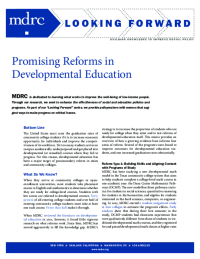Promising Reforms in Developmental Education

Bottom Line
The United States must raise the graduation rates of community college students if it is to increase economic opportunity for individuals and improve the competitiveness of its workforce. Yet too many students arrive on campus academically underprepared and get placed into developmental (or remedial) courses where they fail to progress. For this reason, developmental education has been a major target of postsecondary reform in states and community colleges.
What Do We Know?
When they arrive at community colleges or open-enrollment universities, most students take placement exams in English and mathematics to determine whether they are ready for college-level courses. Students with low scores are referred to developmental courses. Forty percent of all entering college students and over half of entering community college students must take at least one such course. Fewer than half make it through.
When MDRC reviewed the literature on developmental education in 2011, however, it found little rigorous research on what reforms work. Since then, MDRC has moved aggressively to fill the knowledge gap. MDRC’s strategy is to increase the proportion of students who are ready for college when they enter and to test reforms of developmental education itself. This memo provides an overview of how a growing evidence base informs four areas of reform. Several of the programs were found to improve outcomes for developmental education students, and one increased graduation rates substantially.
Reform Type 1: Building Skills and Aligning Content with Programs of Study
MDRC has been studying a new developmental math model in the Texas community college system that aims to help students complete a college-level math course in one academic year: the Dana Center Mathematics Pathways (DCMP). The new model has three pathways: statistics for students in social sciences; quantitative reasoning for students in the humanities; and algebra for students interested in the hard sciences, computers, or engineering. In 2015, MDRC started a random assignment study at four colleges to estimate the program’s effects. Early analyses show that during their first semester in the study, DCMP students had classroom experiences that were qualitatively different from those of students in traditional developmental math courses, and they registered for and passed developmental math classes at higher rates than their standard group counterparts. MDRC is adding more students to the study and following students for longer, to determine whether DCMP students are also more likely to succeed in college courses and graduate.
Reform Type 2: Boosting Skills Before Students Enter College
As coleader of the National Center for Postsecondary Research, MDRC conducted a random assignment study of eight summer bridge programs in Texas that offered students accelerated, focused learning opportunities between high school and college. Students in the program group passed their first college-level math and writing courses at higher rates than those in the control group, though evidence of the effects faded after two years.
The City University of New York (CUNY) has devised a prematriculation program called CUNY Start. It condenses the time students spend preparing for college English and math into one semester. In spring 2015, CUNY and MDRC began enrolling students with substantial developmental needs — most of whom were referred to developmental reading, writing, and math — for a random assignment study at four CUNY colleges. The first results are due to be published in the spring of 2018.
Reform Type 3: Speeding Students’ Progress Through Developmental Courses
Tarrant County College in Fort Worth, Texas, has divided each developmental math course into modules, to allow students to progress at their own pace. MDRC is conducting a random assignment study to determine whether students pass through these modular courses more quickly than standard developmental math. Early findings show that after one semester, students randomly assigned to ModMath were, on average, closer to completing the developmental math sequence than students randomly assigned to traditional, lecture-based courses.
Reform Type 4: Extra Support
MDRC has studied performance-based scholarships — need-based scholarships contingent on student performance — in seven states, and found that they produce modest long-term impacts on academic progress and graduation. The findings appear to be consistent across programs with varying designs and for many types of students, including those who require remediation. In one program, in Tampa, Florida, MDRC worked with Hillsborough Community College to offer a scholarship for developmental math students that included help in an on-campus Math Lab. In another, scholarships without additional services were offered to developmental education students at two New York City community colleges.
MDRC has also tested “learning communities,” in which groups of students are placed together in two or more courses with aligned content, and given extra support. In a demonstration project at six colleges, MDRC found that the programs increased the credits that developmental education students earned by a small amount (half a credit) in the programs’ targeted subjects of English or math, and increased the overall credits they earned by the same small amount.
The most successful program that MDRC has studied in 15 years of research on college reforms combines elements of these approaches and several others, including enhanced student services. CUNY’s Accelerated Study in Associate Programs (ASAP), designed and implemented by CUNY, gives students referred to developmental education a tuition waiver to fill any gap between financial aid and tuition and fees, free MetroCards for use on public transportation (contingent on participation in essential program services), and free use of textbooks. ASAP also requires students to enroll full time; provides them with comprehensive guidance from an adviser with a small caseload along with enhanced career services and tutoring; puts them in linked courses for the first year; and offers a seminar on setting goals and study skills. MDRC found that after three years the program nearly doubled graduation rates.
MDRC is now evaluating an effort by three community colleges in Ohio to replicate ASAP. Early results show that students who were offered the program have had better short-term outcomes, including positive effects on enrolling full time, earning more credits, and persisting into the second semester.
Looking Ahead
MDRC has launched a national center to study developmental education, in partnership with the Community College Research Center at Teacher’s College, Columbia University. The center is funded by the Institute of Education Sciences in the U.S. Department of Education. In addition to the evaluation of DCMP described above, the center is conducting a national survey of developmental education policies and practices, and a rigorous evaluation of alternate systems of remedial assessment and placement. MDRC is developing and testing lower-cost models that draw on the lessons from this comprehensive portfolio of studies and that aim to produce the same leaps in achievement as were seen with ASAP. To keep up with MDRC’s projects in developmental education and to find a digital version of this document with links to all sources, visit www.mdrc.org/issue/focus/developmental-education.
For more information, call Alexander Mayer at 212-340-4476 or e-mail him at Alexander.Mayer@mdrc.org.






